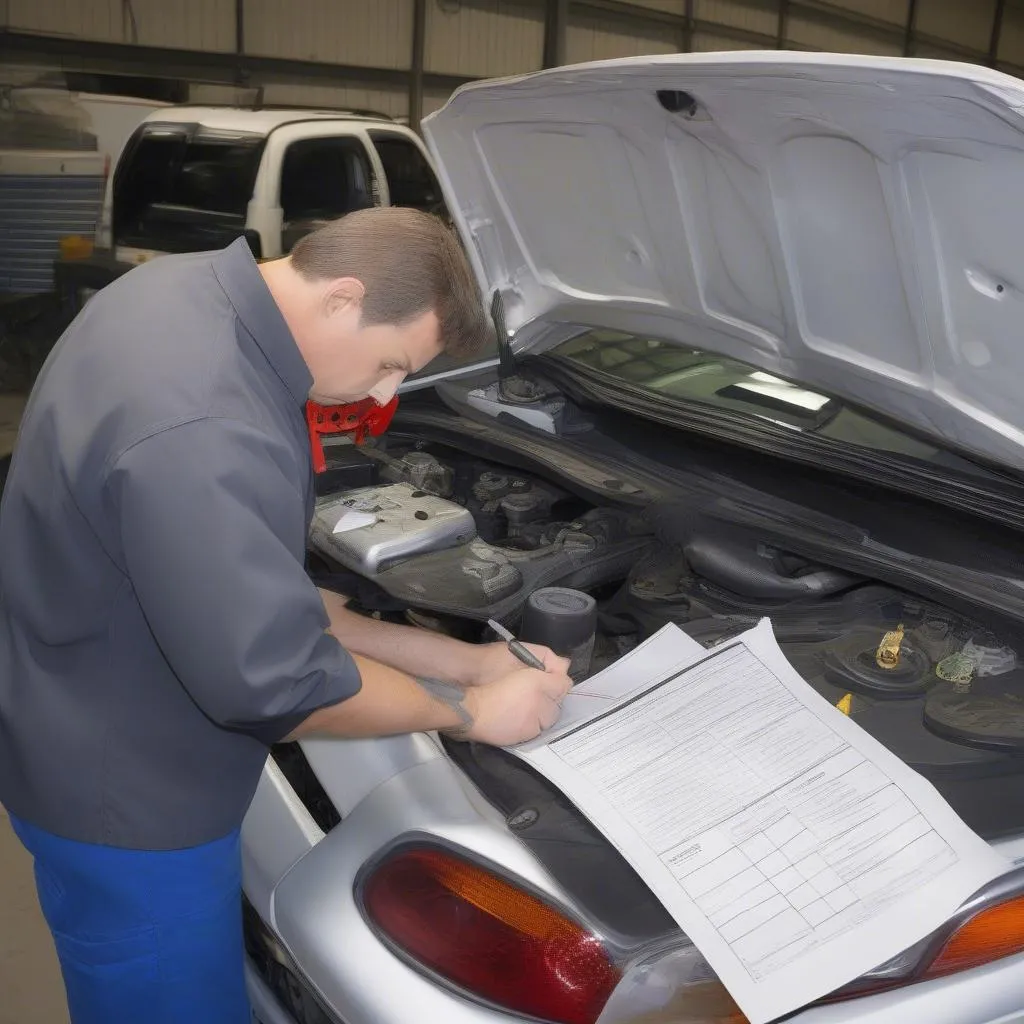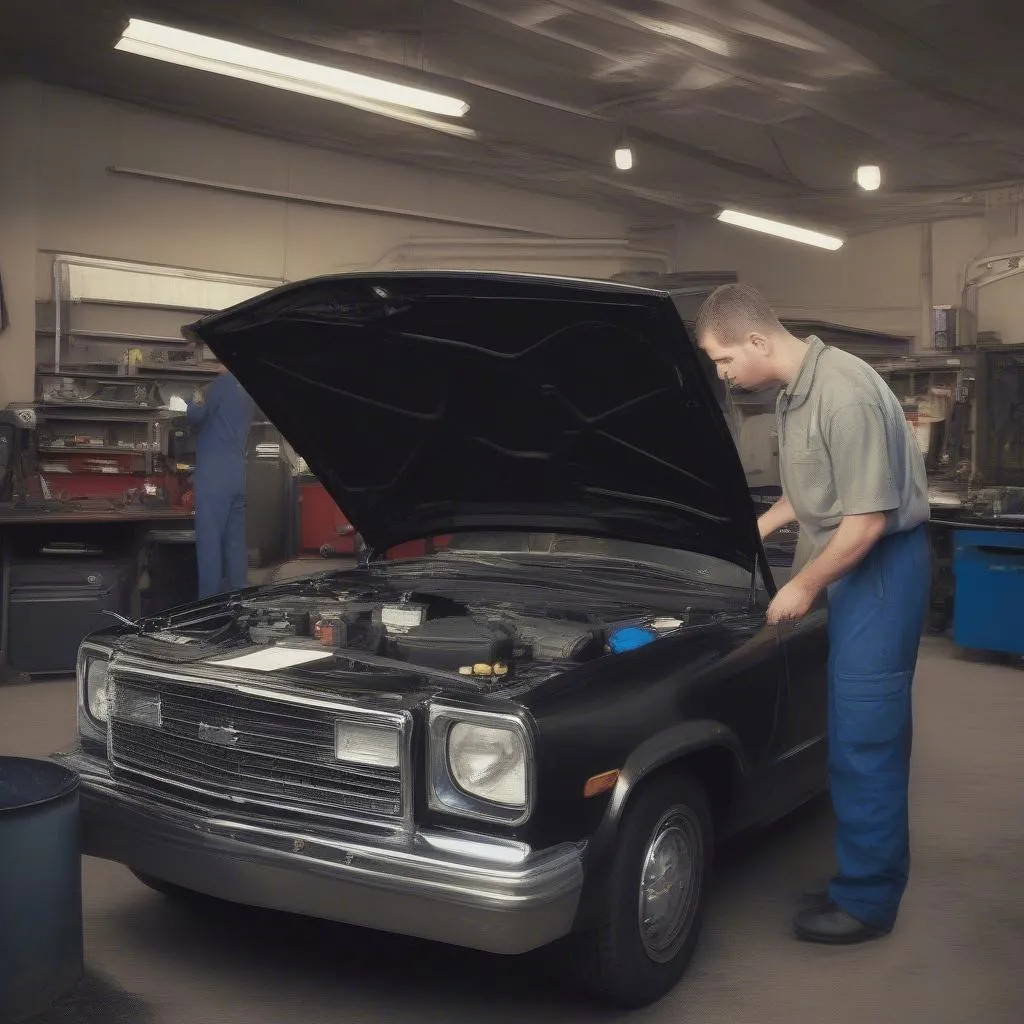Imagine this: you’re driving down a busy highway, feeling confident in your car. Suddenly, your brakes fail. Or your steering wheel locks up. Scary, right? These are just two examples of what can happen if your car isn’t properly maintained. That’s why car safety inspections are so important.
What is a Car Safety Inspection?
A car safety inspection is a thorough examination of your vehicle’s essential safety components. Think of it as a health checkup for your car, making sure it’s roadworthy and safe to drive. Mechanics check things like:
- Brakes: They’ll inspect the brake pads, rotors, calipers, and lines to ensure they’re in good working order.
- Steering: They’ll inspect the steering wheel, tie rods, and suspension to ensure they’re properly aligned and functioning correctly.
- Lights: They’ll check your headlights, taillights, brake lights, turn signals, and hazard lights to ensure they’re all working properly.
- Tires: They’ll examine your tire tread, pressure, and overall condition to ensure they’re safe for driving.
- Exhaust system: They’ll check for leaks or blockages in the exhaust system, which can be a safety hazard.
- Emissions: They’ll test your car’s emissions to ensure it’s meeting environmental standards.
- Windshield wipers: They’ll ensure they’re in good condition to clear your windshield of rain and snow.
Why are Car Safety Inspections So Important?
Car safety inspections are important for a few reasons:
- Safety: As mentioned earlier, a car safety inspection helps to identify potential safety hazards that could lead to accidents.
- Legal: Many states require car safety inspections to ensure vehicles meet minimum safety standards. Driving without a valid inspection could result in fines and penalties.
- Maintenance: Car safety inspections can identify problems with your car’s maintenance. Catching issues early can help prevent expensive repairs down the road.
- Peace of mind: Knowing that your car has been inspected and is safe to drive can give you peace of mind while on the road.
How Often Should I Get My Car Inspected?
How often you should get your car inspected depends on the laws in your state and the age of your vehicle. Some states require annual inspections, while others have different requirements. Older cars generally require more frequent inspections.
What Happens During a Car Safety Inspection?
During a car safety inspection, a mechanic will thoroughly examine your vehicle’s safety components. They’ll check for any signs of wear and tear, damage, or malfunction. The mechanic will also test the vehicle’s brakes, steering, and lights. If any issues are found, the mechanic will let you know and advise you on what repairs are needed.
 Car Safety Inspection Checklist Form
Car Safety Inspection Checklist Form
What to Expect After a Car Safety Inspection?
After a car safety inspection, you will receive a report that details any issues found and the recommended repairs. If your car fails the inspection, you will need to get the necessary repairs done before you can drive it again.
What if My Car Fails a Safety Inspection?
Don’t panic if your car fails a safety inspection. This is a common occurrence. Your mechanic will give you a list of repairs that need to be made. Once these repairs are completed, you can have your car re-inspected.
Can I Perform a Safety Inspection Myself?
While you can perform a basic safety inspection yourself, it’s best to leave the job to a qualified mechanic. They have the expertise and tools needed to thoroughly inspect your car and identify any potential problems.
 Professional Mechanic Conducting a Car Safety Inspection
Professional Mechanic Conducting a Car Safety Inspection
Tips for Keeping Your Car Safe
Here are some tips for keeping your car safe between inspections:
- Regular maintenance: Get your car serviced regularly, including oil changes, tire rotations, and brake checks.
- Check your fluids: Regularly check your car’s fluids, including engine oil, coolant, and brake fluid.
- Check your tires: Regularly check your tire pressure and tread. Make sure your spare tire is in good condition.
- Keep your lights clean: Make sure your headlights, taillights, brake lights, and turn signals are clean and working properly.
- Be aware of your car: Pay attention to any unusual noises, smells, or vibrations that might indicate a problem.
Questions You Might Have about Car Safety Inspections
- Is it really necessary to get my car inspected? Yes, it’s essential to keep your car safe, and in many states, it’s also required by law.
- How much does a car safety inspection cost? The cost of a car safety inspection varies depending on your location and the mechanic you choose.
- What happens if I drive my car without a valid inspection? You could face fines and penalties.
- Can I get a safety inspection at a dealership? Yes, many dealerships offer car safety inspections.
Car Safety Inspection Resources
- https://diagxcar.com/prime-care/ This website provides a comprehensive guide to car maintenance and safety, including information on car safety inspections.
- https://diagxcar.com/honda-cars-for-sale/ You can find used cars that have been inspected and are ready to drive safely.
Conclusion
A car safety inspection is an essential part of keeping your vehicle safe and roadworthy. It’s crucial for identifying potential safety hazards and ensuring your car meets legal requirements. Remember, keeping your car in good condition is not just about its performance, but also about the safety of yourself, your passengers, and other drivers on the road.
Do you have any questions about car safety inspections? Let us know in the comments below!
Need help with car diagnostics or repair? Contact us on Whatsapp: +84767531508.


